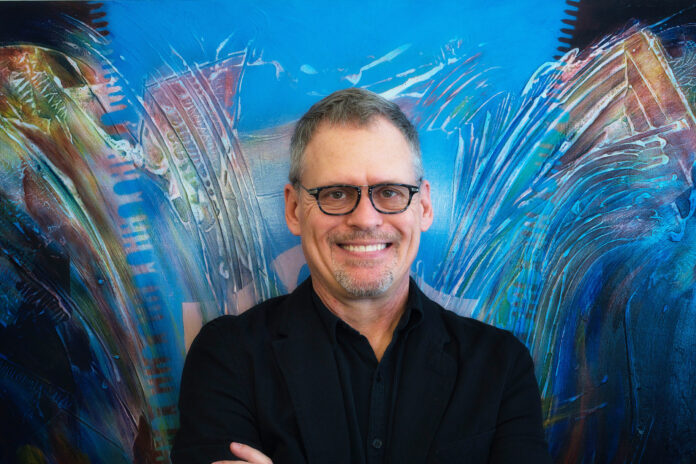
Robert Boschman’s life took an traumatic turn before he was even born.
On Dominion Day weekend in 1940, when Canadians across the country were preparing for outdoor picnics and summer trips, Boschman’s grandmother died in a hit and run in Saskatoon. His grandfather watched, horrified, from across the street.
The death impacted the family for years afterwards. Boschman first learned about it as a child, later calling it a formative experience in his young life. As an adult, the event was a starting point for his memoir, White Coal City, which came out in this month from University of Regina Press.
“Throughout my adulthood, I’ve been wanting to tell that story, and it’s taken me a long time,” says Boschman, who currently teaches at Mount Royal University in Calgary, where he’s the chair of the Department of English, Languages, and Cultures. “It was really hard because I wanted to do it right, and walk away from it knowing that I did my best. I’m a bit of a perfectionist, so there are a lot of moving parts.”
Boschman started his research in the 1990s, and continued into the 2000s. He described it as “good old gum-shoed investigation” that took him through everything from coroner’s records and court documents to police interviews written in frantic short-hand.
However, White Coal City goes beyond those events in 1940 to give an honest look at what happened to Boschman and his family after he found out about his grandmother’s death. That story continues in his hometown of Prince Albert, and the streets and rinks where he grew up.
Race divisions, class divisions and hockey are front and centre in Boschman’s memoir, and he doesn’t shy away from the painful or negative aspects. In fact, he’s a little nervous about how current and former Prince Albert residents will take the criticism, but he believes it’s a story that needs to be told.
“I see White Coal City as a North American story,” Boschman explains during a phone interview. “It’s not just a story of a (single) place, but a story of a place like so many other places right across North America. I hope readers will see PA and White Coal City as emblematic of the vast network of settler communities across the continent, and how settler stories are always embedded in a far older set of human narratives involving community and language, story, love, creation, loss.
“I think PA has some things to answer for,” he adds. “There has been some hurt done. I saw some of that and I experienced some of that as a kid—the violence and the bullying and the hardcore, hard hockey mentality. I went through all of that and it left its mark on me…. I hope it (gets) some good responses, but I’m not sure. I don’t know if I’m going to get praise or death threats.”
Hockey in Prince Albert is a source of great joy and great pain for Boschman. He remembers playing on rinks throughout the winter, then switching to street hockey with friends when the snow melted.
However, that camaraderie and love for the game disappeared when he got older and started playing competitive hockey. He eventually quit the game due to the bullying and abuse, but it followed him away from the rink. Even just wearing his old team’s jacket turned him into a target for former teammates.
“(Hockey) was a beautiful thing, but when I got up into upper tier hockey, that became kind of a nightmare for a kid like me,” he remembers. “It meant report cards, and coaches shouting at me, getting bullied by teammates and getting criticized a lot, and getting called names. That left a scar on me, and I don’t think I’m alone in that.”
Race relations play prominent role in his memoir too, but Boschman makes it clear he’s talking about his own experience and no one else’s. He grew up at the height of the Sixties Scoop, when non-Indigenous families adopted tens of thousands of Indigenous children. That list includes his own family, who adopted a young Cree girl named Crystal.
While Boschman remains close with his adopted sister today, he said the Indigenous perspective is not his to tell.
“I get a little outraged when I see white settler authors trying to appropriate what isn’t there’s, in terms of identity and history, and I felt that was really important here,” he says. “I say it at the very outset of the book. I can’t tell their stories, but I can tell my story, and what I saw as a witness during my white settler childhood. That’s what I hope I’ve achieved.”
Although he’s based out of Calgary, Boschman still keeps up with what’s happening in his hometown. Although he’s critical of it, he says he wants the best for the residents.
A big part of that involves reconciliation between between Indigenousn and non-Indigenous people. He’s hopeful his memoir will show the truth about what Prince Albert was like during the ’60s and ’70s, and help people across Canada have some difficult conversations.
“I don’t think people really know about (life in Prince Albert,)” he adds. “Some people do, but I think a lot of Canadians don’t, and certainly Americans for sure don’t. When I look at Prince Albert and its history, I think, ‘we’ll, there’s a lot here that’s shared with (communities) right across the continent.’”
White Coal City: a memoir of place and family is available in stores, and online through from the University of Regina Press Website and Amazon.ca.

